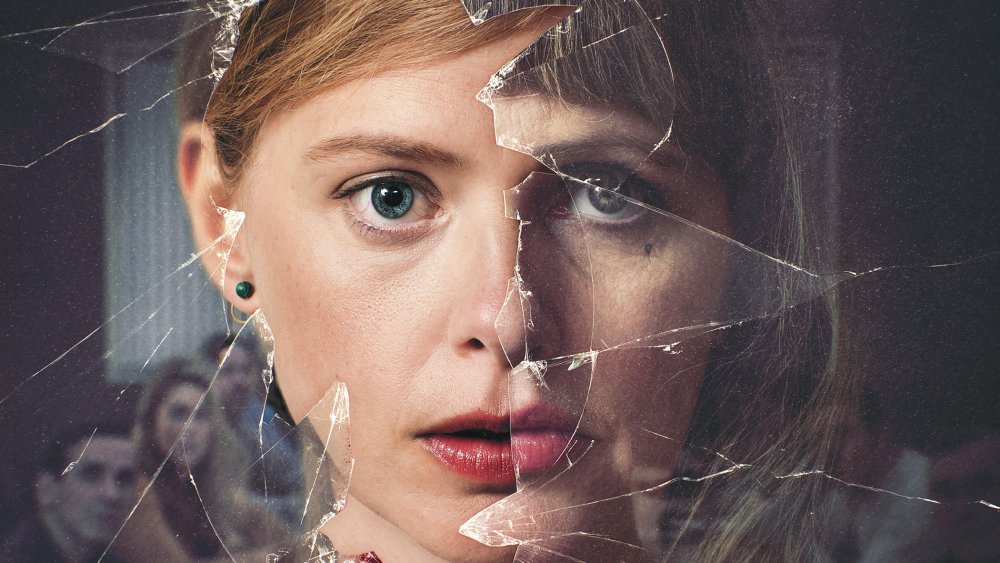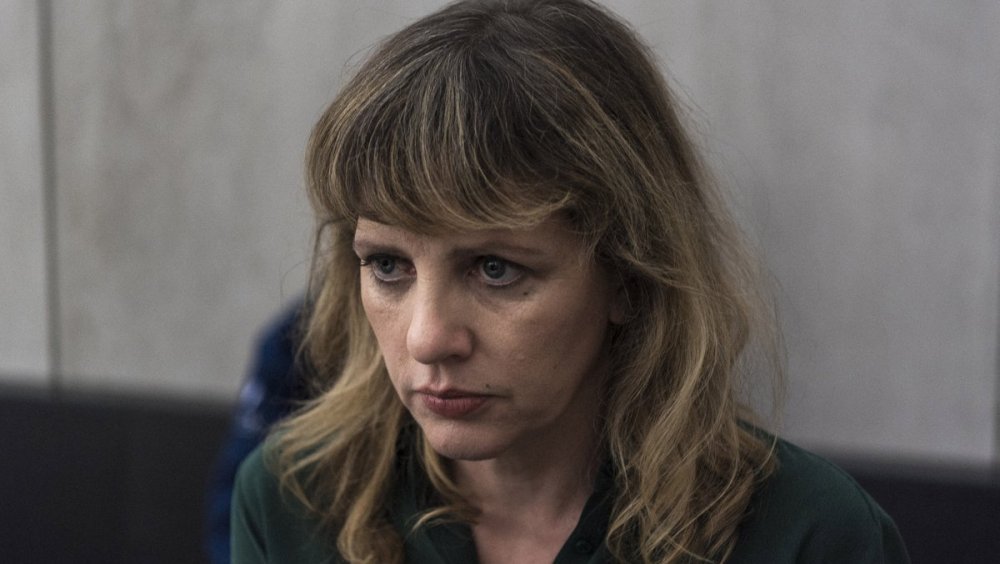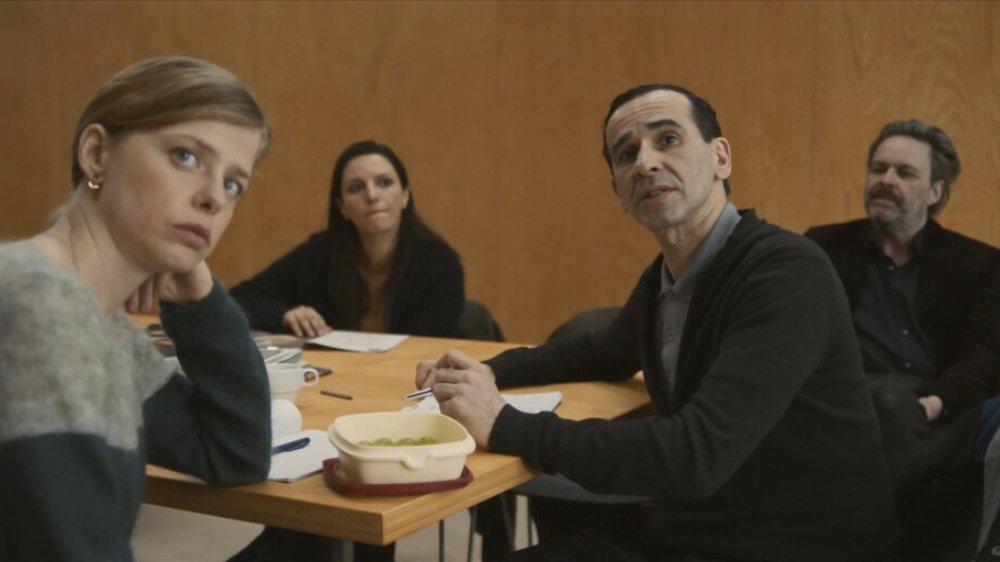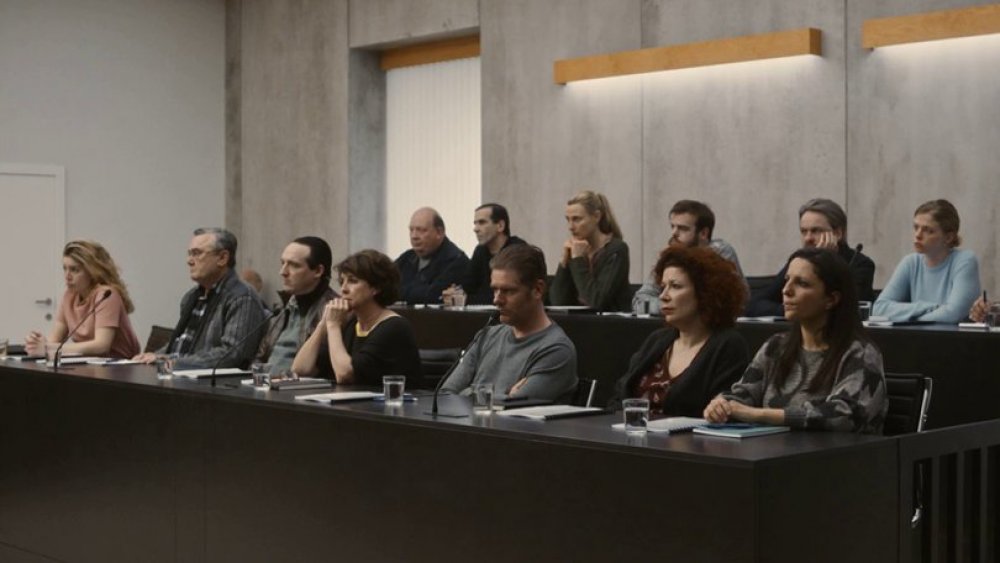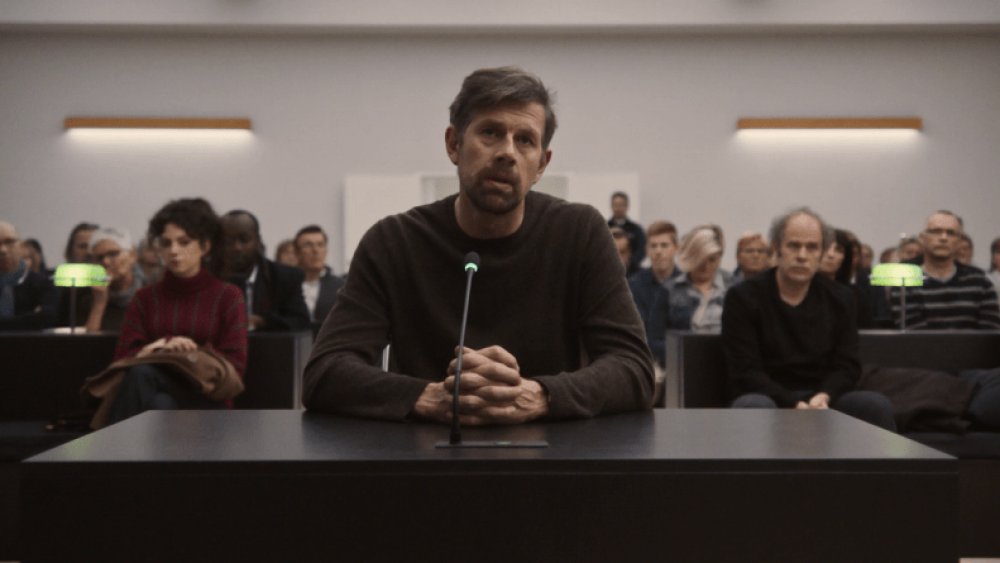The Ending Of The Twelve Explained
Contains major spoilers for The Twelve
Netflix's newest international crime thriller series The Twelve, otherwise known as De Twaalf in its origin country Belgium, comes to an explosive end with its tenth episode — where we get a peek into the ultimate fates of each principal character, hear the verdict of the contentious trial we've been lead through beat by beat, and have the truth of both murders fully revealed to us at last.
Co-created by Bert Van Dael and Sanne Nuyens, The Twelve follows the titular group of 12 jurors assigned to a murder case. As Frie Palmers (Maaike Cafmeyer) stands on trial for allegedly killing her daughter Roos (Estelle Sys) after losing custody of her to her ex-husband, she's also accused of murdering her best friend Brechtje Vindevogel (Lynn Van Royen), who once dated Frie's ex-husband Stefaan De Munck (Johan Heldenbergh).
Though the story itself is wholly fiction, at its heart, The Twelve is described by its showrunners as a reaction to political events in Belgium — where for a time some major criminal justice procedural rules were subject to change. Because of the expense to the state, trial rules were temporarily modified to limit juries to just four laymen and three judges, blending the legal concepts of a jury trial and a bench trial, but the idea was ultimately ruled unconstitutional and abandoned. "We found it thought provoking to focus on the ordinary people that get drawn by lot for jury duty. Most of the courtroom dramas we know focus on the lawyers or the defendant, but we really wanted to have the point of view of normal people," the showrunners explained to Variety.
The dense narrative and intersecting character timelines turned what might've seemed at first to be a straightforward legal drama into something much broader and philosophical indeed, so if the ending of The Twelve left your head spinning a bit and wondering just what the truth is, never fear! There's a lot to pull apart from the ending, and we're here to dig into the most important moving parts, what they mean, and help understand the themes at play.
The verdict and final twist of The Twelve
The final episode of The Twelve shows the ultimate verdict: Frie is convicted of the murder of Brechtje, but is not found culpable for her daughter Roos' death. At one point, Holly (Charlotte De Bruyne) even asserts that it's reasonable to assume a murder legally never took place in Roos' death, as the question of intent to kill was not an unassailable fact by any means. One of the judges confirms this as legally correct, and that if any jurors doubted the existence of intent, the juror should vote to acquit — and they do.
The big twist, however, comes on the final minutes of the episode. Frie requests her lawyer Ari (Josse De Pauw) bring a pop-up book from her home to her. When he goes to retrieve it, he finds two major surprises inside its pages: black gloves, and a delicate gold necklace that spells "amour" — both subject to many questions during the trial for their absence.
This revelation changes everything and nothing all at once. Frie is guilty of both acts of violence, and she's confessing as much to her attorney all these years later at last. The kicker here, however, is why. During a previous scene, Ari explains to Frie that he'll start the paperwork to declare a mistrial — something that could easily be granted since Noël (Piet De Praitere) leaked trial proceedings to the press. Frie isn't enthused and angrily asks why she should if she's only opening herself up to the possibility she'll be convicted for Roos' murder. In confessing to Ari with the critical items that prove guilt in both cases, she's revealing herself to be the person the prosecution says she is: pathologically unwilling to accept reality and seen as a bad mother. Frie can live with the conviction for killing Brechtje; she can't live with the public knowing that she's responsible for what happened to Roos.
The ending of The Twelve weighs up morality against legal correctness
The Twelve makes a concerted effort throughout its ten episodes to separate law from morality. This is shown most distinctly in Joeri's (Tom Vermeir) journey, and especially during the last two episodes.
Joeri is wracked with guilt over the death of an undocumented immigrant on his construction site, and eventually begins to believe he deserves the strictest punishment possible. However, he's completely willing to fall on his own sword for his sleazy addict brother Bjorn (Dominique Van Malder), who suggested the hare-brained plan to leave the worker on a public bench anyway. Holly makes her best effort to point out the flaws in his logic and attempts to assuage him and his guilt — even going so far as to reveal that she was indeed present at her own parents' murders — but to no avail. He did break the law, but he attempted to make up for his mistakes and is personally suffering for his decisions. During a jury deliberation break, Holly asks Joeri point-blank if the situation with the worker has clouded his judgement amid Frie's trial and whether he would have ruled differently if the trial and the accident hadn't occurred at the same time; Joeri responds that he doesn't know.
Arnold (Peter Gorisson) also highlights this disparity during deliberations, making many excellent points on the major gaps in the prosecution's testimony, which leaves acres of room for reasonable doubt — the definitive standard of legal guilt. This argument, however, changes no minds. So many on the jury feel it's necessary that some punishment be meted out to Frie, even if it doesn't necessarily have to do with the murder. She seems guilty, as many jurors explain helplessly; we ultimately learn that she is in both cases. Is the result moral, if not legally, correct? Were they right, or at least justified in their decision? That's for the viewer to decide.
The Twelve explores the human quality
As our favorite crotchety diagnostician Dr. House once told us, everybody lies. Lying is the bedrock of The Twelve, but that doesn't mean that the story is intended to be cynical or nihilistic. This trial featured people from many different walks of life, all of whom perform acts of both common heroism and pettiness, and possess positive and negative qualities. Arnold is a homophobe but ultimately the most clear-eyed about how the justice system is supposed to operate. Noël is a recovering sex addict and sells information to a tabloid journalist, only to later assist in saving the life of his fellow juror Delphine (Maaike Neuville). He even gives all of Delphine's sacrifices purpose by giving up his jurist seat so she can take over as substitute. Holly learns the value of forgiveness and what conscience can do to punish more than the law ever could. Carl (Zouzou Ben Chika) comes to accept his and his daughter's autism but cannot accept Holly and Arnold's commentaries on reasonable doubt.
Lies are human nature — lies we tell others as well as ourselves, and the (very, very gray) heroes of the story break themselves free of the lies they've constructed for themselves. That's why there's no sense of victory for Stefaan (Johan Heldenbergh), Naïma (Souad Boukhatem), and her mother Lutgard (Jolente De Keersmaeker). They lied themselves into their respective places, and when the trial was over, all that was left was the ruin of their lies revealed to each other. It doesn't matter that they were justified in their fear of Frie — they didn't tell the truth when it mattered most for the integrity of their relationships. Their lives as they knew them are over for it, not fixed as they hoped it would be by taking Frie so earnestly to trial. In the end, Frie had little to do with what they inflicted on each other. The human capacity for duplicity in the name of selfishly saving face is.
The ending of The Twelve: What was it all for?
If you feel like you don't know what to feel upon finishing The Twelve, that's actually part of the point. Showrunners Bert Van Dael and Sanne Nuyens explained to Variety that giving no true answer is the intent, and that their show is more interested in examining the jury trial as a philosophical question.
"We hope The Twelve shows both sides after ten episodes because this is very much how we feel,'" they said. "Maybe there's also a problem of our definition of what prejudice or bias is. We think our show also questions the legal need to 'put prejudice aside.' We all have our different backgrounds as a person, and maybe it's next to impossible to be completely 'free of bias.' [...] We don't think our show gives an answer to these questions. We think it raises the question more than answering it. [...] Maybe one day there will be a good answer to it."
Is this a condemnation of the method from the creators, then? It's not that simple either. As Van Dael and Nuyens stated, "The interesting fact for us was that our series encompasses both the good and the bad of the jury system. We feel that there's something really good to say about juries, and we feel that there's bad things to say. [...] Maybe a jury system is not per se the best or the most fair system, but it could very well be 'the best system we have at hand'."
Most of what occurred on The Twelve inside and outside of the courtroom wasn't fair to anybody. A thousand intersecting cruelties and blessings occurred because of the complexity of individual lives slamming together for the sake of an imperfect method to punish crime. But it did all happen — and as the final scene tells us via pop song, it's not over, just keep going. There doesn't have to be an answer, but we need to be conscientious that we aren't an island in a sea of passive anonymous faces, for the good of everyone.
The Twelve is streaming on Netflix now.
